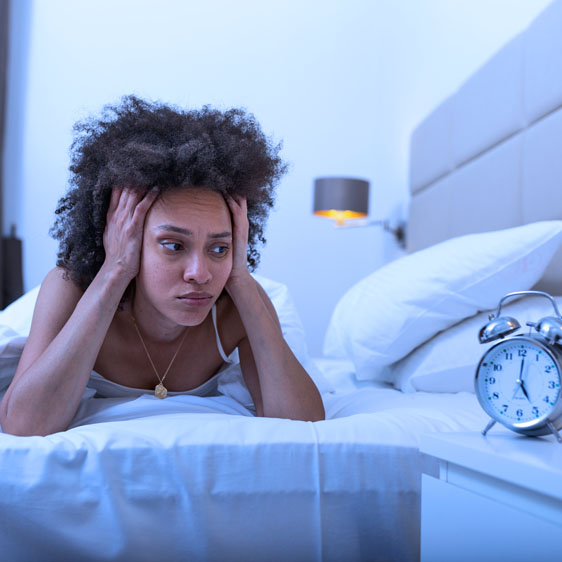
In our fast-paced world, it's easy to skimp on sleep so you can take care of an extra item on your to-do list. Getting enough rest isn't just about waking up ready to seize the day. There are health implications to getting enough rest each night.
Lack of Sleep and Cancer Implications
Depending on the quality of sleep and how much shut-eye you get, your sleep, or lack thereof, might affect your cancer risk. Studies have shown a link between a lack of quality sleep and a risk of cancer. The strongest correlation is in people whose circadian rhythm, or biological clock, has been disrupted.
"While we’re asleep, our bodies repair DNA damage, turn different genes on and off, control the growth of cells, and build up the immune system. Sleep offers time for repair and restoration, in addition to fortifying defenses against illness," says Dr. J. Eric Turner, a board-certified and fellowship-trained medical oncologist at Beaufort Memorial Oncology Specialists. "Those who are chronically sleep deprived can experience chronic inflammation, insulin resistance and suppressed levels of melatonin. Each of these items plays a role in damage to DNA, which may lead to cancer."
Those who are chronically sleep deprived can experience chronic inflammation, insulin resistance and suppressed levels of melatonin. Each of these items plays a role in damage to DNA, which may lead to cancer.
Read More: Are You Getting Enough Sleep?
Trouble Sleeping During Cancer Treatments
Another link between cancer and sleep is how difficult it can be to get good sleep after diagnosis and while undergoing cancer treatment. As many as half of patients with cancer have problems sleeping, according to the National Cancer Institute.
The emotions of dealing with a cancer diagnosis, in addition to anxiety, digestive-system upsets, hot flashes, other side effects from medications and pain, all have the potential of keeping you from falling asleep or staying asleep, Dr. Turner says. Sleep difficulties may arise at different points along your cancer journey.
It is important to work with your cancer care team and let them know if you aren't getting good rest.
Importance of Sleep for Cancer Patients
Sleep not only gives you energy, but it also increases your body’s ability to heal. So don’t overlook sleep as part of your overall treatment plan.
According to the National Sleep Foundation, your body produces fewer cytokines — a type of protein that helps control the growth and activity of other immune system cells and blood cells — when you lack sufficient sleep. These proteins are both produced and released during sleep.
When released, cytokines tell the immune system to do its job. Cytokines affect the growth of blood and other cells that help the body's immune and inflammation responses. They also help to boost anti-cancer activity by sending signals that can help make abnormal cells die and normal cells live longer.
In addition to its physical implications, sleep plays an important role in mental health. Getting enough sleep can help a cancer patient during a time when many decisions are made and treatment instructions need to be remembered. Sleep also helps with an overall feeling of being able to cope and having the energy to deal with the disease. Insomnia in cancer patients can even lead to mood disturbances and psychiatric disorders.
How Much Sleep Do You Need?
 The National Sleep Foundation's recommendations are different depending on your age. Below are the number of hours healthy individuals should strive for each night. If you are dealing with illness, your needs will be increased.
The National Sleep Foundation's recommendations are different depending on your age. Below are the number of hours healthy individuals should strive for each night. If you are dealing with illness, your needs will be increased.
- Newborns (0-3 months): 14-17 hours
- Infants (4-11 months): 12-15 hours
- Toddlers (1-2 years): 11-14 hours
- Preschoolers (3-5): 10-13 hours
- School-age children (6-13): 9-11 hours
- Teenagers (14-17): 8-10 hours
- Younger adults (18-25): 7-9 hours
- Adults (26-64): 7-9 hours
- Older adults (65+): 7-8 hours
Having Trouble Sleeping?
 If you’re having trouble sleeping, here are some things to try:
If you’re having trouble sleeping, here are some things to try:
- Go to bed and wake up at the same time each day.
- Get outdoors or sit near a sunny window during the day to help reset your circadian rhythm.
- Establish a relaxing bedtime routine without the use of electronic devices.
- Sip on a cup of herbal tea, such as chamomile.
- Limit the amount of fluid you drink right before bedtime to help eliminate waking to use the restroom.
- Try a diffuser with lavender oil or another calming essential oil.
- Use a relaxation technique, such as focusing on your natural breathing pattern, to help quiet your mind.
- Limit caffeine and alcohol, especially before bedtime.
- Avoid heavy, spicy or sugary foods late in the evening.
- Exercise during the day.
- Make sure your bedroom is a comfortable temperature, dark and quiet.
- Get a back rub or massage to relieve pain or help you relax.
- Turn your bedside clock away from you so you won’t keep checking the time if you are lying awake at night.
If you are being treated for cancer, be sure to speak with your cancer care team about your sleep issues as some home remedies may not be appropriate.
Read More: Get a Good Night’s Rest
The oncology nurse navigators, counselors and social workers at the Beaufort Memorial Keyserling Cancer Center in Beaufort can be a good resource. Many patients try to take on too much and worry about being a burden to their families if they can't fulfill usual obligations. By connecting patients with community resources, our team helps place appropriate priority on the rest patients need to cope with their illness.
Learn more about the cancer-related support and resources available through Beaufort Memorial.
Updated: April 2025

